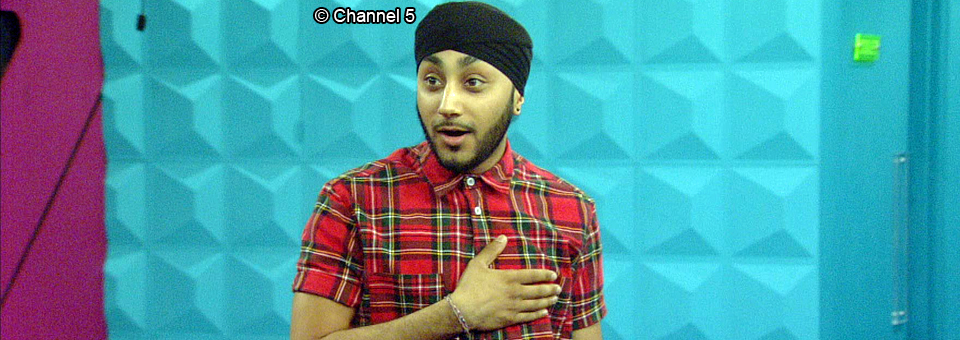“There’s an apna on TV!” comes the cry from the living room as the whole family rushes down to see who is featuring on what channel and in what context. In recent years this scenario has probably been acted out less and less in South-Asian households with the arrival of community-based satellite television channels and rapidly-increasing internet videos, but nonetheless it was probably something some of our UK readers experienced earlier this week when turbaned-Sikh from Essex, Pavandeep Singh Paul joined the contestants on Big Brother 2014.
The first thought that came to my mind when I heard that a Sikh was entering the Big Brother house on Monday was surprise that Big Brother was still on television. At the turn of the century when it first aired in the UK, the reality series was a revelation and you couldn’t open a newspaper, tune in to the radio or stand at the water-cooler without hearing all about it. Even if you never watched the highlights show on Channel 4, or tuned in to the live stream online, you knew about Big Brother. But like all things on television, the popularity of the show waned and in recent years it has apparently been airing on Channel 5 who picked up the broadcasting rights when Channel 4 decided it’s time was up. In the relative digtal wasteland of the least popular free-to-air channel in the UK, it’s true that Mr Paul is unlikely to garner too much attention, but within the Sikh community his efforts will no doubt be followed. As a community we have such little representation on national platforms that any appearance, no matter how fleeting, is met equally with both excitement and trepidation.
As a community we can be quite unfair and uncompromising towards an individual in this situation, who at least on the face of it is appearing on television (or any other national medium) based on their own merits. It is perhaps all too easy for us to hold that person up as representative of the Sikh community when in many cases they simply happen to be Sikh or of a Sikh background. Sure, as a minority community, a Sikh on a national platform has to accept that an audience will often reflect upon other Sikhs based on what they see through them, but I can empathise with the desire to be considered as an individual with your own faults and talents, and not emblematic of a whole community. However, this doesn’t apply to any individual who has the opportunity of appearing on a national platform simply because they are a Sikh; nor does it apply to anybody who makes the (ill-thought) claim that they in any way represent Sikhs. Pav Singh Paul is a case in point who in his biography on the official Big Brother website inexplicably says that he, “is keen to educate the world on Sikhism“, adding in the Daily Mirror that his hopes of winning the reality show is “for the Sikhs“. Big mistake!
Every word, action and emotion by Mr Paul will now be analysed for how it makes the Sikh community look. Whilst his appearance on Big Brother has only just begun, controversy has already arisen in the form of his official Big Brother biography and associated tabloid newspaper interviews. It has not gone unnoticed that his biography states, “due to his beliefs, Pav has never cut his hair“; a strange assertion to make when he visibly trims his facial hair. Some of our readers who are ‘trim-Singhs’ might baulk at this observation; you shouldn’t, unless of course you too have boasted publicly that you have never cut your hair because of your beliefs, begging for the question in response as to where your hair ends and your sideburns start. This is not a case of ostracising a section of the community who maintain uncut hair on their head but not their face, rather to ask why it is something to raise at all on a reality TV show? It opens up a conversation that Sikhs rarely have themselves let alone on a national platform. Similarly, he admits to being “a shallow man, [in girls] looks are important to me and a strong fashion sense“, three traits which are common enough in wider society, but coming from somebody who is hoping to educate the World on Sikhism they are appalling and in no way reflective of the values espoused by the House of Guru Nanak. Perhaps Mr Paul thinks that educating the World on Sikhism involves him sitting comfortably on a couch and talking about the 5 K’s, but if he does he is in for a shock – people learn about the way of life you profess to belong to by the values you live by and the deeds you do.
I feel for Mr Paul because he is to some extent a product of our society, both as a member of the Sikh Diaspora and a citizen of a first World country. There is not nearly enough emphasis placed on learning itself, instead focusing on where grades and valuations can take us; discourse and dialogue is largely dismissed, just as the relationship between what we believe and what we practice goes unexplored; the result is there for all to see, riddled with contradictions and buffet-table philosophies. We spend so much time as a Sikh community talking about do’s and don’ts, that we fail to equip ourselves with the tools that reached those conclusions before us, just as Mr Paul is showcasing, sadly in his case on a national TV show. Mr Paul has every right to go on Big Brother and compete without being harangued by his community, but when he makes the claim that he does so to represent that community, he needs to understand that we will call him up when we feel he is misrepresenting us. I have neither the time nor the heart to delve deeper into the misgivings that his interviews and biography have already created about the Sikh way of life – “asking for a ‘quickie in the photocopy room'” was enough to make me recoil in despair – but i’m sure he will face plenty of questions from ‘his’ community when his five minutes of fame are over. I recall a news feature from many years ago at the height of the reality TV invasion on to our screens where a politician was asked as to why so few black, Asian and other ethnic minorities were featuring on reality TV shows. “They have more sense than that” was his reply. I wish we did.





